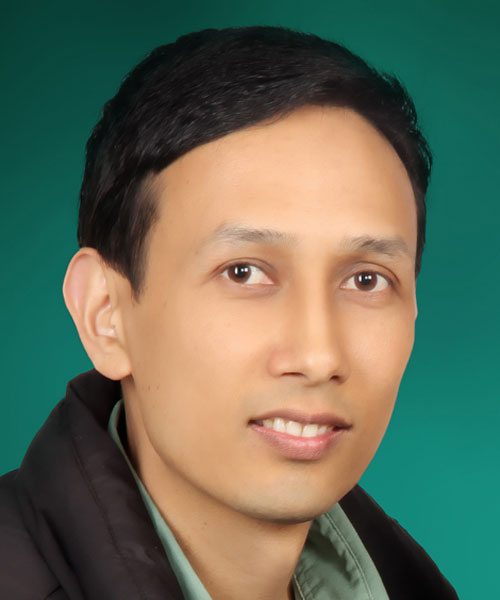Bijay Singh, a Nepali chemist and a principal investigator at the Research Institute for Bioscience and Biotechnology (RIBB) in Kathmandu is the 2016 recipient of the Atta-ur-Rahman Prize in chemistry. He wins the prize for his outstanding results in the field of biomaterials, a new type of carrier molecules that may encapsulate several compounds and direct the delivery of drugs, genes and vaccines with pinpoint accuracy.
The prize is granted annually by 1985 TWAS Fellow Atta-ur-Rahman, a Pakistani chemist and a past president of the Pakistan Academy of Sciences. It aims at acknowledging the work of researchers from scientifically lagging countries that have obtained high-impact results in various fields of chemistry.
"I'm very grateful for this prestigious prize, as it will raise my scientific profile within the Nepali scientific society," Singh said. "Although I'm proud of it, being a scientist in Nepal is not easy. We're still missing expensive instruments, reagents and facilities. This is why we often depend on foreign countries for complex analysis. I'm sure that the Atta-ur-Rahman Prize will help me and my career, and will allow me to be more competitive in joining some faculty in the Academy."
Singh holds a master’s of science in chemistry from Tribhuvan University; he earned his PhD in biochemistry in 2011 from the Sun Moon University in South Korea. In Korea, he began a successful career focusing on antibiotic resistance: the ability of bacteria to escape the effect of antibiotics, thus surviving in the host. It's an important medical problem that affects many countries, including Nepal.
Upon his return to Nepal in 2011, Singh founded the Research Institute for Bioscience and Biotechnology (RIBB), which is now among the most renowned institutes in Nepal. Singh, with his wife Sushila Maharjan – a recipient of the 2016 Elsevier Foundation Award – and ten friends, invested some USD50,000 in this project. The institute has been receiving several TWAS research grants since 2013.
"We struggled for two years," he said, "but thanks to funds we received from TWAS, we feel now more confident in the future."
At RIBB, Singh has continued his biochemical research on antibiotic production, studying Nepali bacteria of the Streptomyces family, to find potential novel molecules that can combat the emerging drug-resistant diseases.
"Bacteria normally release small molecules called antibiotics to protect themselves from fungi or the environment," he explained. "Overuse of antibiotics in hospitals and health centres has forced bacteria to find strategies to survive, becoming resistant." Now he is trying to engineer bacteria that will produce new, modified antibiotics, in effective amounts, to help solve the problem of resistance.
In 2013, Singh joined Seoul National University in South Korea to pioneer the challenging field of biopolymers and polymer chemistry. Polymers are long strings of molecules that bond together to form complex structures. They can be engineered to host drugs inside, and when they encapsulate drugs or genes, they become nanoparticles. One example is the use of doxorubicin or lithocolic acid, both anticancer drugs, used for liver therapy after encapsulation in a polymer called PEG, which allows crossing cells' membranes.
"Nanoparticles can easily cross biochemical barriers in the organism," he explained. "Therefore, we are using them to deliver drugs and genes on specific targets. Using targeting drugs, we can selectively kill cancer cells and spare the healthy ones."
Singh's experiments are now testing the feasibility of this approach in laboratory models, but he is confident that they will soon be able to move to humans. Another field where he is investing energy and resources is in the design of new types of vaccines. "Vaccinations procedures are common in Nepal," he says, "but, in general, vaccines are injected, which makes them not user-friendly. We are working on orally deliverable vaccines that, if successful, will have an impact on Nepali society."
For his contributions, Singh has been honoured with the "2015 Excellent Article Award" by Seoul National University. In addition to his scientific activity, he works to educate young scientists in Nepal by organizing scientific meetings and seminars. He has authored 35 scientific publications in international peer-reviewed journals, along with five book chapters. He has filed four patents.
Cristina Serra
About the Atta-ur-Rahman Prize
The Atta-ur-Rahman Prize was established in 2012 by TWAS Fellow Atta-ur-Rahman of Pakistan, a leading scientist and scholar in the field of organic chemistry, renowned for his research in areas related to natural product chemistry. He has also been an influential advocate for science education. The award brings a prize of USD5,000 now sponsored by the Dawood Foundation, and is annually given to a talented chemist, under the age of 40, who lives and works in any of the 81 scientifically lagging countries.
Winners are invited to attend the TWAS General Meeting and give a public lecture on their work. Each of the five TWAS Regional Offices is asked to present one candidate from their region, and the final selection is made by Professor Raman. Previous winners are: Mirabbos Hojamberdiev, Uzbekistan (2015); Mohamed Fawzy Ramadan Hassanien, Egypt (2014); Mohammad Abdul Hasnat, Bangladesh (2013); and Shamsun Nahar Khan, Bangladesh (2012).

